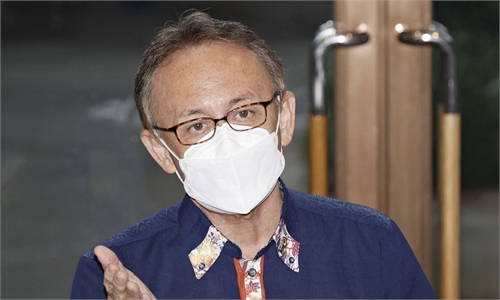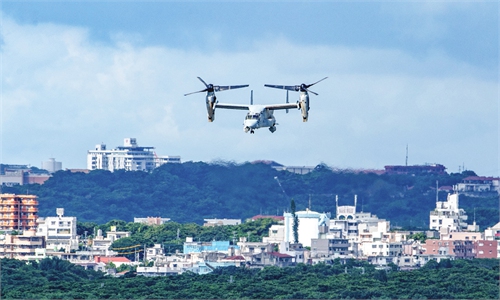IN-DEPTH / IN-DEPTH
Reelected Okinawa governor wishes to inject hope, transition prefecture from a conflict-ridden US military base hub to a cultural and tourist region
Future of hopeful peace
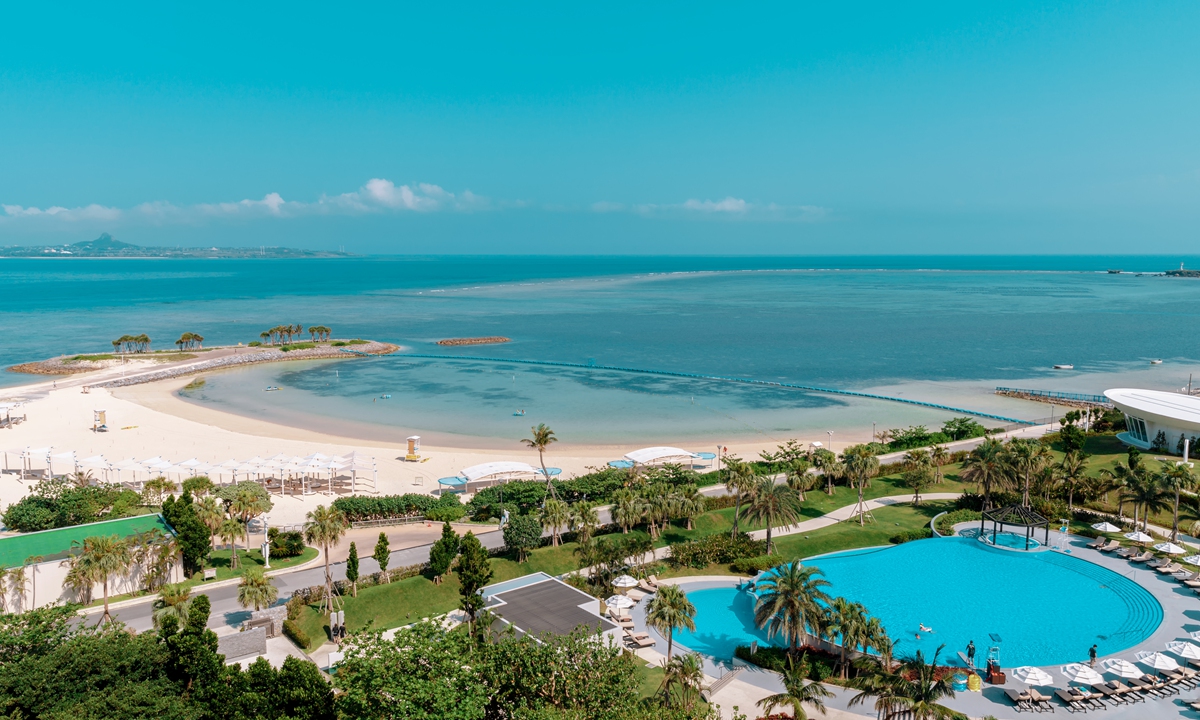
A view of the sea in Naha,Okinawa. Photo: VCG
Editor's Note:This is the real version of "Japanese fragmentation" - Okinawa, which occupies only 0.6 percent of the total surface area of Japan, hosts more than 70 percent of the US military bases stationed in Japan. The military bases located in Okinawa's central and southern metropolitan areas exist like split cities. The Japanese government has frequently hyped up its rhetoric that "any contingency for Taiwan is a contingency for Japan,"and regards Okinawa as a natural barrier to "protect" the mainland of Japan. However, the Japanese government seems to have forgotten how the Battle of Okinawa in 1945 was waged at the cost of hundreds of thousands of lives. The strong dissatisfaction of ordinary people in Okinawa for having their home turned into a battleground and base for US military operations has gone largely ignored.
In his first exclusive interview with a Chinese media outlet, Denny Tamaki (Tamaki), who was reelected as Governor of Okinawa Prefecture in September, told the Global Times that "there must be no war again." He shared his thoughts with Global Times reporter Xing Xiaojing (GT) his attitude toward US military bases and his striving for peace among other poignant topics.
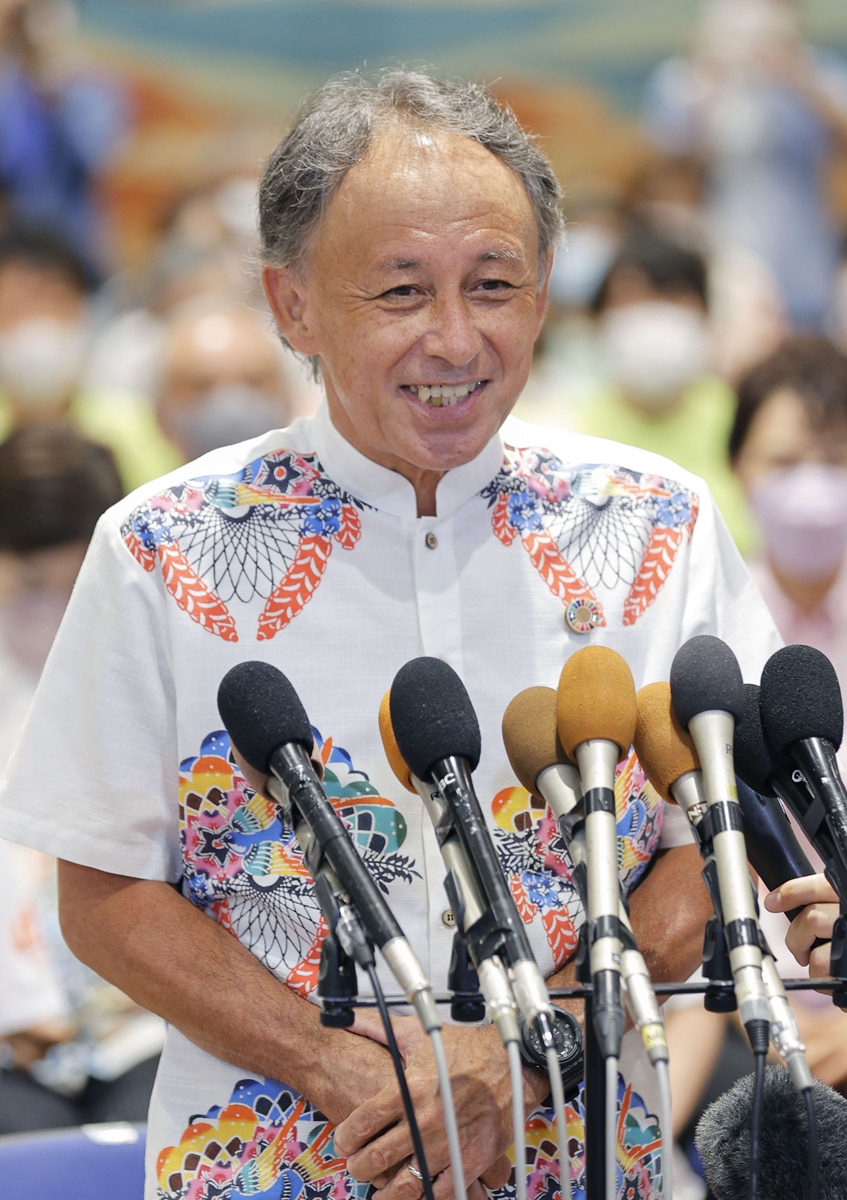
Denny Tamaki. Photo: VCG
Real public will of Okinawa
GT: Japanese public opinion generally believes that your reelection shows the will of the Okinawan people and also represents "the struggle between the Okinawan people and the Japanese government." How do you feel after being reelected? How will you deal with the construction of the new Henoko base, a project to relocate the US Marine Corps Air Station Futenma in Ginowan, and other issues related to the US military bases in Okinawa in the future?
Tamaki: I think I was reelected because the Okinawan people have put their trust in my efforts and achievements over the last four years. They also support what I proposed during the election campaign, including opposition to the new Henoko base and the expansion of support for children, young people, and women.
During the gubernatorial election, it was a focal point during the debate on whether to build a new base for the US military in Henoko. I made a clear promise that I would not agree to the building of a new base and my reelection shows that I have gained the trust of many people, and at the same time, I deeply feel the burden entrusted to me by the people.
Regarding the construction of the new Henoko base, I think it is very important to seek solutions through dialogue. In order to fulfill our commitment not to build a new base in Henoko, we will relentlessly call on the Japanese government to adopt a democratic posture and resolve it through dialogue and negotiation.
Regarding the issue of the US military bases in Okinawa, even today, 77 years after the Battle of Okinawa [a major WWII ground battle between Japanese and US troops] and 50 years after the US' return of Okinawa to Japanese rule, about 70.3 percent of the US military's exclusive facilities in the country are concentrated in this prefecture. Environmental issues such as noise, water pollution, and incidents related to the US military continue to unfold.
I understand the necessity of the Japan-US security agreement, but the burden of the bases on the Okinawa Prefecture is abnormal and has reached an unbearable level. This year marks the "50 years of return" and Okinawa Prefecture put forward six demands to the Japanese government as early as May 2021, which include "rectification and reduction of the size of US military base stationed in Okinawa" and "relief of tensions in Asia" among others. Okinawa Prefecture will continue to actively and tirelessly appeal to the governments of Japan and the US in a clear manner to reduce the burden of the military bases on Okinawa.
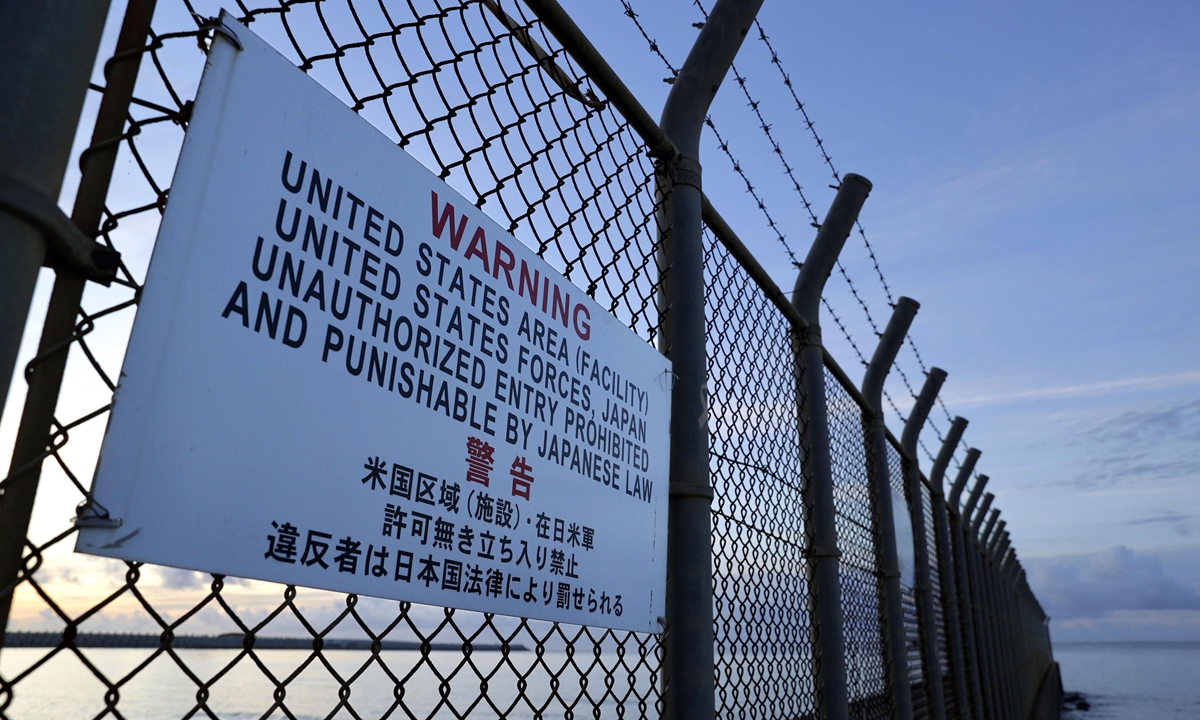
Photo taken on August 24, 2022 shows a warning sign by US troops in Japan placed at the Henoko coastal area of the Okinawa Prefecture. Photo: VCG
GT: A poll of Okinawans once showed that about 90 percent of the respondents believed that there is an economic gap between Okinawa and the Japanese mainland. How can this economic gap be bridged? Some people voiced that the US military bases can stimulate Okinawa's economy to a certain extent. In your opinion, how should the base issue and economic development be reconciled?
Tamaki: When Okinawa "returned to Japan" in 1972, the prefecture's social and economic conditions were lagging behind, and the income level of the prefecture was low. With the implementation of a series of subsequent policies such as building dams, ports, airports and roads, tourism, information, and other related industries have witnessed steady improvement. But the per capita income of Okinawa Prefecture is only 70 percent of the national level in Japan.
In order to develop the local economy, it is necessary to facilitate the development of tourism, information, and other related industries. In addition, we should make full use of Okinawa's geographical advantage in the "center of East Asia," make use of digital technology to expand demand at home and abroad, and develop a global business.
Before answering the question of how to reconcile the base issue and economic development, I would like to introduce some background information to your readers.
The US military bases in Okinawa are mainly located in the central and southern metropolitan areas where the population is concentrated, occupying a large part of the municipal area, and exist in the form of split cities. In addition to generating noise and causing environmental pollution, the existence of the bases also limits social and economic activities such as urban planning, the complete integration of the transportation system, and the construction of industrial infrastructure.
In the economic composition of Okinawa Prefecture, the share of military-related income has dropped significantly from 15.5 percent in 1972 to 5.5 percent in 2019. Now, the economic benefits generated by conducting economic activities on the former base sites returned by the US military have greatly exceeded the economic benefits generated by the original bases. If the US military continues to promote the return of base land in the future, it is expected that Okinawa's economy will grow by leaps and bounds.
'War must not happen again'
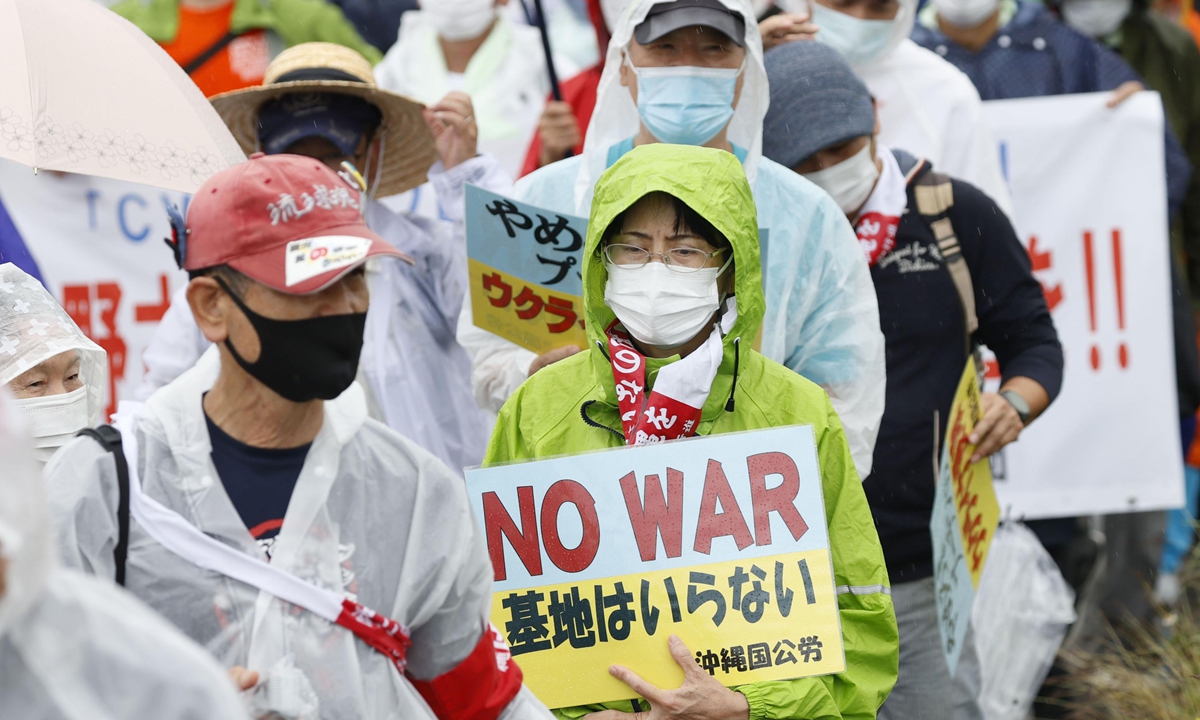
People hold a march calling for the burden on Okinawa from hosting US forces to be lifted in Okinawa on May 14, 2022. Photo: VCG
GT: While some Japanese politicians have actively clamored for Japan's involvement in the Taiwan question, Okinawans have held a series of events calling for "not turning Okinawa into a battlefield." In your opinion, what is the real threat to Okinawa? What are the real demands of Okinawans in terms of security and safety?
Tamaki:The Battle of Okinawa in 1945 was an extremely brutal war. From this painful experience the Okinawans felt the preciousness of peace and sincerely longed for lasting world peace. The Chinese people also suffered greatly in the war; I believe that the people of both China and Japan share the view that war must never happen again.
I hope to make Okinawa a place where everyone can actually be wealthy and feel safe, secure, and happy. To achieve this goal, peace and stability in the Asia-Pacific region is essential.
Okinawa will be concerned with the escalation of regional tensions and the occurrence of unpredictable events. We will not allow Okinawa to be targeted by military strikes because of the so-called "any contingency for Taiwan is a contingency for Japan." I believe that it is extremely important that all parties concerned can engage in calm and peaceful diplomatic dialogue to reduce tensions and build confident relations. I will take every opportunity to call on the Japanese government to do so.
On the basis of establishing peaceful relations, exchanges in many fields such as economy, tourism, culture, and academia can be actively carried out to promote the mutual development of multiple areas, the significance of which needs no further explanation for Okinawa and also for the people of the world. I would also like to take the opportunity of this interview to share this view with readers in China and other countries around the world.
GT: In many interviews, we still often hear Okinawans speak about "discrimination," "bullying," and "human rights violations." It seems that 50 years after Okinawa's return to Japan from post-WWII US occupation, Okinawans still face these problems, which are more serious than the outside world would think. What are your thoughts on this?
Tamaki: Okinawa not only has a concentration of about 70.3 percent of special facilities for US forces in Japan, but also has problems arising from the unequal US-Japan Status of Forces Agreement. The US-Japan Status of Forces Agreement is a treaty that determines the use of US military bases in Japan and the status of US forces, which has not been amended since its inception in 1960. As social conditions have changed, and the public have become more aware of human rights and environmental protection issues, the agreement no longer meets the needs of the people of Japan. Various issues such as military base management rights and environmental pollution are often criticized.
Whenever incidents caused by the presence of US military bases occur, due to the constraints of the agreement, Japan's domestic laws cannot be applied and the authority of local governments cannot be fully exercised, resulting in the emergence of persistent "structural discrimination." Worse still, the situation in Okinawa has not been fully understood by the whole of Japanese society, resulting in criticism and slander of Okinawa and its people.
The Okinawa Prefecture will continue to demand that the Japanese government reduces the excessive burden of US military bases and fundamentally revisit the US-Japan Status of Forces Agreement. At the same time, we will also continue to publicize the problems that Okinawa had to face to the rest of Japan and create an opportunity for all citizens to participate in the discussion of solutions.
'Looking forward to visiting sister province'
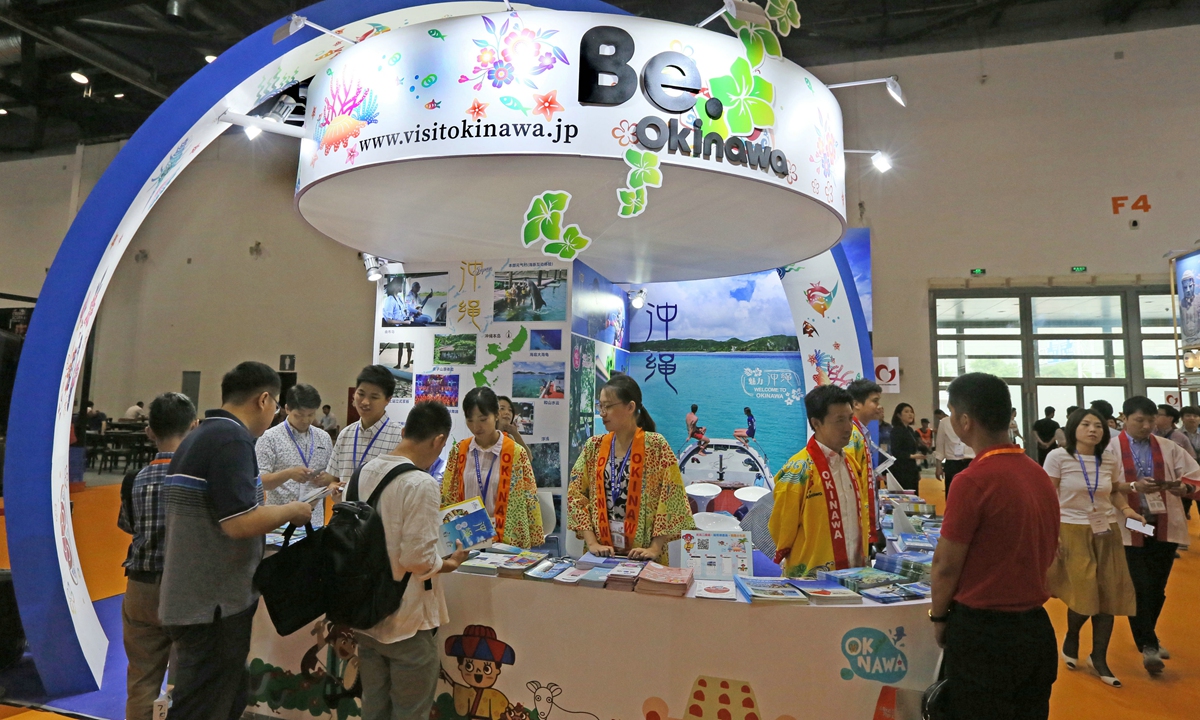
People visit the Okinawa exhibition area at the Beijing International Tourism Expo on June 15, 2018. Photo: VCG
GT: Before the outbreak of COVID-19, multiple-entry visas issued to Chinese individual tourists visiting Okinawa had helped your prefecture to attract a large number of Chinese visitors, which also promoted interactions between Chinese people and Okinawans. What do you think can be done to strengthen Okinawa's ties with China in the future?Tamaki: Data show that in 2019, the number of foreign tourists visiting Okinawa was about 2.5 million, of which 613,700 were from the Chinese mainland, accounting for 24.6 percent. Six cities in China - Beijing, Shanghai, Tianjin, Hangzhou, Nanjing, and Chongqing - have air routes to Okinawa to facilitate Chinese tourists' travel to my prefecture.
After the easing of epidemic prevention and control in the future, we plan to take advantage of the opening of Chinese overseas offices in Beijing and other places to activate the cultural and economic contacts that have been cultivated in the past through exchanges from tourists and business visits.
I have visited China twice. The first time was in 2011. When I was a member of the House of Representatives, I accompanied a delegation that visited China for the purpose of economic exchange. At that time, I visited the Great Wall of China and other historical sites. The second trip was in April 2019 when I visited with members of the Japanese Association for the Promotion of International Trade. That trip once again took me to Beijing, the first Asian city I had visited since I first became governor of Okinawa in 2018. I remember that at that time we discussed how to further promote economic exchanges between Okinawa and other parts of China with Chinese government officials and business people.
This year marks the 25th anniversary of Okinawa's forging of friendly relations with Fujian Province [in East China]. Unfortunately, currently I cannot visit Fujian. I am looking forward to visiting Fujian in the future. I will feel the history, culture, and natural landscape of the province which has a deep connection with Okinawa.
GT: On November 24, the Okinawa Prefecture and Fujian Province will host a ceremony to mark the 25th anniversary of the establishment of their friendly relations. Some cities in Okinawa also have sister-city relations with Fuzhou, Xiamen, and Quanzhou. How do you view the conclusion and development of such bilateral relations?
Tamaki:Since Ryukyu Kingdom (1429-1879), Okinawa and Fujian had a communicating history for more than 600 years. Cultural, economic, and people-to-people exchanges helped Okinawa's unique culture to flourish. Based on the accumulation of historically friendly relations, in September 1997, the Okinawa Prefectureand Fujian Province concluded a sister Prefecture-Province?treaty, promoting the cultural, economic, and people-to-people exchanges till present day.
I want to reaffirm the importance of friendly relations. We are willing to further strengthen exchanges between Okinawa and various places in China. Although we have no plans to establish sister city relations with other Chinese cities as yet, we will make full use of our overseas offices in China to further promote friendly exchanges between the two sides.
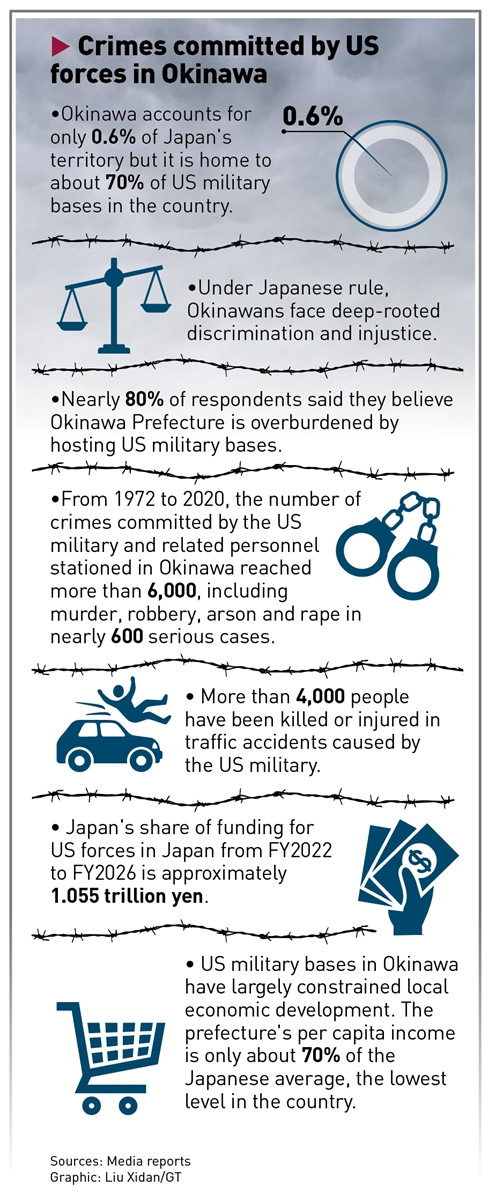
Graphic: GT

